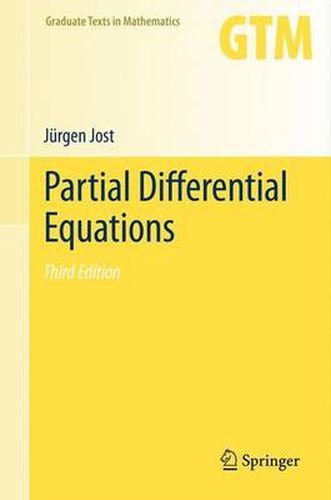Readings Newsletter
Become a Readings Member to make your shopping experience even easier.
Sign in or sign up for free!
You’re not far away from qualifying for FREE standard shipping within Australia
You’ve qualified for FREE standard shipping within Australia
The cart is loading…






This title is printed to order. This book may have been self-published. If so, we cannot guarantee the quality of the content. In the main most books will have gone through the editing process however some may not. We therefore suggest that you be aware of this before ordering this book. If in doubt check either the author or publisher’s details as we are unable to accept any returns unless they are faulty. Please contact us if you have any questions.
This book offers an ideal graduate-level introduction to the theory of partial differential equations. The first part of the book describes the basic mathematical problems and structures associated with elliptic, parabolic, and hyperbolic partial differential equations, and explores the connections between these fundamental types. Aspects of Brownian motion or pattern formation processes are also presented. The second part focuses on existence schemes and develops estimates for solutions of elliptic equations, such as Sobolev space theory, weak and strong solutions, Schauder estimates, and Moser iteration. In particular, the reader will learn the basic techniques underlying current research in elliptic partial differential equations.
This revised and expanded third edition is enhanced with many additional examples that will help motivate the reader. New features include a reorganized and extended chapter on hyperbolic equations, as well as a new chapter on the relations between different types of partial differential equations, including first-order hyperbolic systems, Langevin and Fokker-Planck equations, viscosity solutions for elliptic PDEs, and much more. Also, the new edition contains additional material on systems of elliptic partial differential equations, and it explains in more detail how the Harnack inequality can be used for the regularity of solutions.
$9.00 standard shipping within Australia
FREE standard shipping within Australia for orders over $100.00
Express & International shipping calculated at checkout
This title is printed to order. This book may have been self-published. If so, we cannot guarantee the quality of the content. In the main most books will have gone through the editing process however some may not. We therefore suggest that you be aware of this before ordering this book. If in doubt check either the author or publisher’s details as we are unable to accept any returns unless they are faulty. Please contact us if you have any questions.
This book offers an ideal graduate-level introduction to the theory of partial differential equations. The first part of the book describes the basic mathematical problems and structures associated with elliptic, parabolic, and hyperbolic partial differential equations, and explores the connections between these fundamental types. Aspects of Brownian motion or pattern formation processes are also presented. The second part focuses on existence schemes and develops estimates for solutions of elliptic equations, such as Sobolev space theory, weak and strong solutions, Schauder estimates, and Moser iteration. In particular, the reader will learn the basic techniques underlying current research in elliptic partial differential equations.
This revised and expanded third edition is enhanced with many additional examples that will help motivate the reader. New features include a reorganized and extended chapter on hyperbolic equations, as well as a new chapter on the relations between different types of partial differential equations, including first-order hyperbolic systems, Langevin and Fokker-Planck equations, viscosity solutions for elliptic PDEs, and much more. Also, the new edition contains additional material on systems of elliptic partial differential equations, and it explains in more detail how the Harnack inequality can be used for the regularity of solutions.